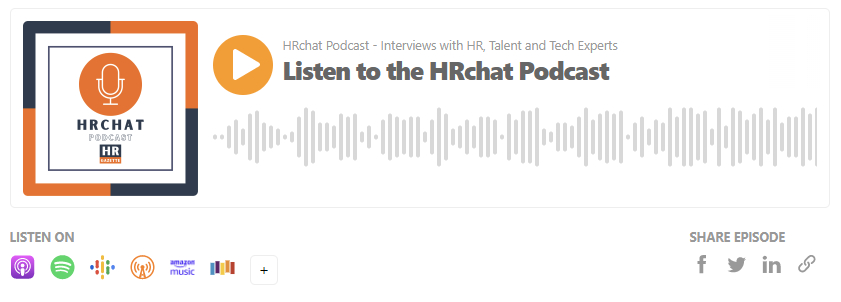
In HRchat episode 598, I welcome back my friend, Dave Millner to chat about the role of the HRBP, contextual changes that are affecting the HR function and new ways data can help.
Dave is an author and Founder at HR Curator Ltd. Dave has a background working in financial services, followed by 30 years of internal and external HR consulting experience at NatWest, PSL, Kenexa and IBM as an occupational psychologist. He has worked directly with various global and multi-national firms offering organizational effectiveness-based solutions focusing on future-proofing their businesses.
Dave is referenced as being a key influencer in a number of HR subject areas via his HRCurator brand. He’s also an Associate with Corporate Research Forum (CRF), GPS Asia, the Centre for Effective Organizations at the University of Southern California (USC), and is an Adviser to iPsychTec, a cultural analytics provider.
He also is a regular presenter at well-known HR events such as DisruptHR; promoting the role of technology, people analytics, and his belief in the need for HR to be more commercial in its approach.
Dave’s first book ‘Introduction to People Analytics’ (April 2020) focuses on the changing role of HR and the increasing demand for data insights. The second edition was released this month!
Questions for Dave include:
- The debate around wellbeing reporting is once more on the agenda, following the recent publication of Workplace Intelligence and Deloitte’s second Annual Workplace Wellbeing Study. You shared a post from TLNT called ‘Should Companies be Required to Report on Employee Wellbeing?‘ What’s your take? Is wellbeing’ an area companies should be mandated to publish metrics?
- You shared another post recently about how new research is showing that having more top-performing middle managers leads to much better financial outcomes. What are some actions that can set managers and their organizations up for success?
- Let’s talk about your book – ‘Introduction to People Analytics’ – which launched today! This is the second edition that you’ve published three years after the first. It now has over 40 case studies, advice from thought leaders and practical tips and insights for HR practitioners to take forward. How has our context changed in the past few years and how, therefore, has the content evolved?
- What are the key messages that you want the book to convey to HR practitioners?
- Let’s talk about why being more data-driven is even more important to the HR function today. In terms of people analytics, talk about the feasibility of HR practitioners undertaking newer forms of complex analysis.
- Last year, you spoke at DisruptHR London. Tell us about your session and your experiences of the event
About HR Curator
The HR Curator has been recognized for the past 5 years as being the “go to” Twitter location to follow for HR practitioners who want to access articles, reports and insights regarding HR from the world of social media in an effort to be more commercially aware and mindful of current and future external trends.
Additionally, HRCurator provides consultancy advice, support, and workshop-based solutions to clients across Europe, Asia, and elsewhere as HR functions make changes that align their activities with the new digital and data-driven demands of the future.

